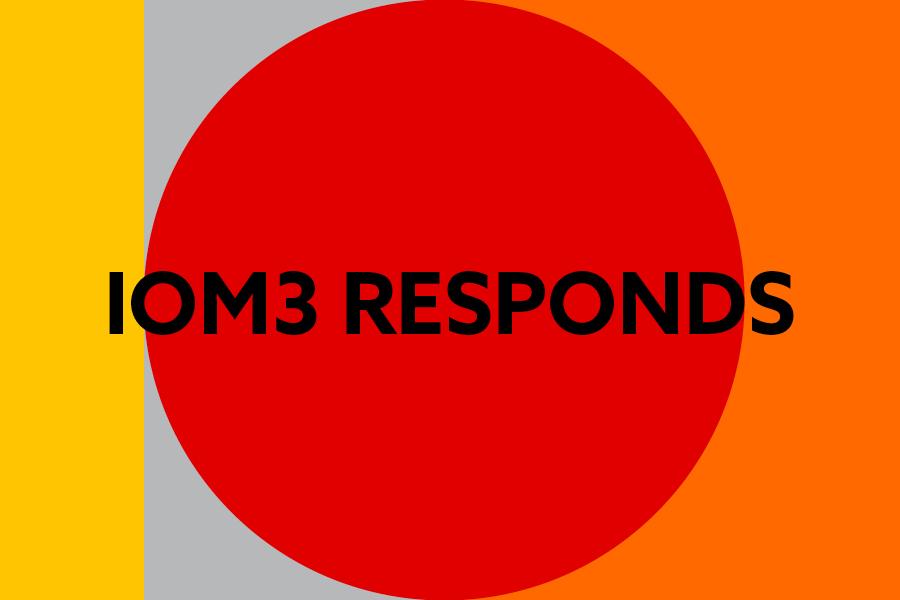IOM3 responds to packaging consultations
IOM3 has submitted written responses to the Extended Producer Responsibility (EPR) for Packaging and Introducing a Deposit Return Scheme (DRS) in England, Wales and Northern Ireland consultations.

These proposals are a welcome further step in designing a packaging and collection system compatible with a resource efficient, low carbon society. Over 10 weeks, IOM3 has worked with nine partners to deliver a series of cross-supply chain collaborative webinars, hosted an online event looking in more detail at the materials specific aspects and heard members’ views through a series of workshops and surveys to best inform our responses.
The main themes of the responses are:
- The systems must maximise the strength of feedback from end of life to packaging providers so the latter are incentivised to improve
- There must be a level playing field between online and offline and U.K. and international businesses
- Good quality data will be supremely important to allow these systems to work as effectively as hoped
- There is likely to be a real shortage of appropriately skilled people to implement these reforms, especially at the pace proposed
- As a consequence of these points and of the scale of the change being sought, DRS implementation should take place over a longer period than proposed
These are set out in more detail below.
IOM3 CEO Colin Church FIMMM CEnv says, ‘As IOM3 works to support its members to be heroes of the transition to a low-carbon, resource-efficient society, not villains, bringing the expertise of its members to bear on big public policy issues will be key. I am delighted with the support we have received from members in pulling this response together. Packaging plays a key role in how modern society works, protecting food and other products on their journeys to our homes and offices. But we need to get it right at all stages of the chain, from raw material selection, through design, manufacture, use and end of life. These proposals, if properly implemented, will make a huge stride towards that overall aim.’
These consultations mark a significant step for the industry and IOM3 would like to thank its members for helping to contribute to the responses.
Jude Allan, Chair of the IOM3 Packaging Society, added, ‘Involvement in these consultations has been a key focus for myself and the Packaging Society Board, it has been really inspiring being part of all the member engagement activities and rewarding to see the amount of collaboration across all of the Technical Communities within IOM3 and across the sectors.'
Summary of the IOM3 responses
IOM3 supports the need for the polluter pays principle to be observed and for producers to be incentivised to minimise packaging use and increase recyclability. While the focus on recycling is an important step, progress must continue in line with the waste hierarchy and towards a more circular economy – keeping products and their materials at their highest value, for as long as possible.
In response to the consultations, IOM3 has called for a system that is fair, transparent, and well enforced. The feedback loop between those who place packaging on the market and the costs and practicalities of its end-of-life management should be as direct and immediate as possible, with layers and interfaces that could potentially attenuate the market signal avoided. A level-playing field is essential, including between online and non-online and UK businesses and non-UK businesses.
IOM3 is extremely concerned about the timelines proposed; both to enable each intervention to be implemented effectively, and for the desired overall reform to be successful. The delays experienced so far have resulted in truncated and misaligned consultation periods, fragmentation of a suite of measures initially conceived as complimentary and each individual timeline to be compacted – fundamentally risking the integrity and success of the reforms.
Introducing multiple measures and wide-ranging change simultaneously will make it difficult to measure what is having the desired impact or the cause, and therefore solution to, any unintended consequences. As a result, IOM3 has called for the introduction of a DRS in England, Wales and Northern Ireland to be delayed until the impact of introducing the plastic packaging tax, EPR and consistent recycling collections (England) can be properly evaluated and thus any DRS implemented in the most effective way.
The success of the proposed reforms will rely on robust, high-quality data with sufficient granularity. The compressed implementation timelines, however, risk inefficient or unsuitable processes and systems being implemented, leading to incorrect, inaccurate or poor-quality data, unnecessary expense and jeopardising the desired scheme outcomes.
In addition, IOM3 is concerned about the availability of appropriately skilled people in the market to deliver the requirements in the timeframe proposed, including to assess the recyclability of packaging, implement the necessary labelling changes and to carry out the required sampling regime.
The full IOM3 responses are built on the foundation of the themes outlined above and can be viewed in full below.







